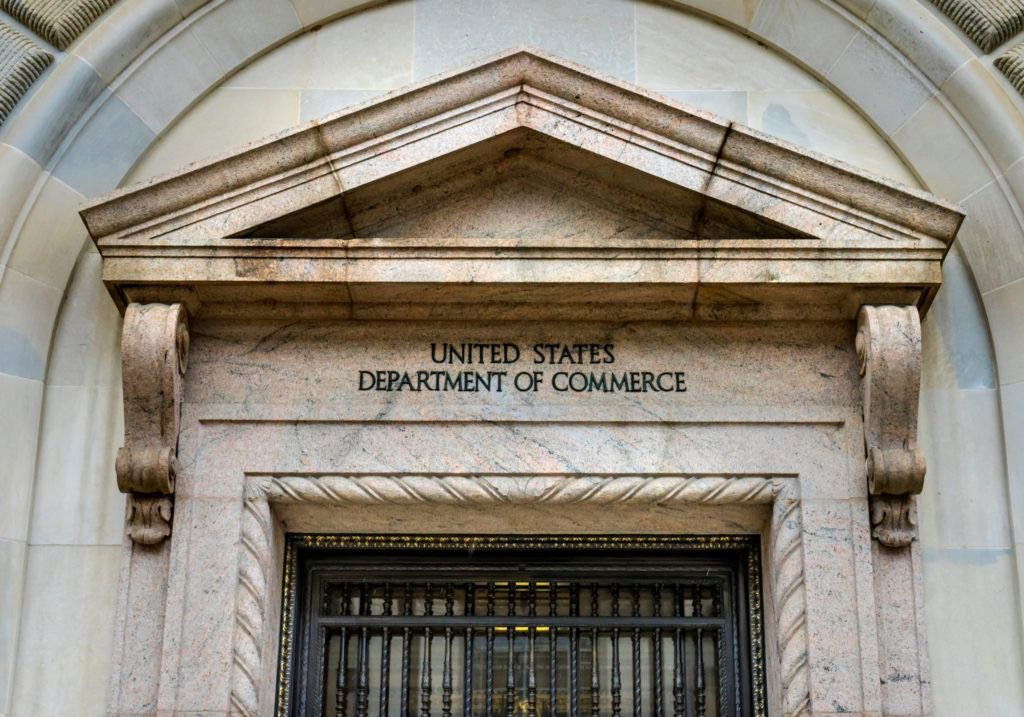
Remarks by Deputy Secretary of Commerce Don Graves at the Business Diversity Principals Kick-Off Event
Jun 13, 2023
Remarks by Deputy Secretary of Commerce Don Graves at the Business Diversity Principals Kick-Off Event
[email protected]
Tue, 06/13/2023 – 15:24
AS PREPARED FOR DELIVERY
Tuesday, June 13, 2023
Office of Public Affairs
Thank you, Under Secretary Cravins. Hello everyone! Welcome to the Commerce Department’s first annual Access Summit, and this convening on Business Diversity! Thank you to all the private sector and philanthropic organizations, thought leaders, experts, and U.S. government colleagues for joining this important conversation.
I’d like to thank my good friend, Mayor Stephen Benjamin, Director of the White House’s Office of Public Engagement, for kicking us off with his timely comments about the Administration’s commitment to equity and the critical role of the private sector in ensuring that all communities have the opportunity to prosper. I also thank colleagues from the Office of the Vice President for being here to convey Vice President Harris’ strong support for the business diversity initiative that we’ll be launching today.
As Secretary Raimondo and I continue to reiterate, we know that our national competitiveness is inextricably linked to equity, inclusion, and access. While people often think of Commerce as the Department of business, we know that competitiveness and inclusive growth depends on policies that support and elevate communities. We really are the Department of communities and people too!
That’s why equity and inclusion cut to the core of our mission of creating the conditions for growth and opportunity for all communities. We are hard at work implementing the President’s 2021 and 2023 Executive Orders related to racial equity and economic development. And, thanks to the Bipartisan Infrastructure Law, the Minority Business Development Agency—the only federal agency created specifically to foster the establishment and growth of minority-owned businesses in America—is now a permanent part of the federal government. We’re thrilled that Under Secretary Cravins is leading MBDA as the first-ever Under Secretary of Commerce for Minority Business Development.
With these initiatives, we have a historic opportunity to drive equity and inclusion goals across government. MBDA has been empowered to foster collaboration across the Federal Government to ensure that minority business enterprises receive an equitable opportunity to benefit from federal programs, including those created by President Biden’s landmark legislation, like the American Rescue Plan, the Bipartisan Infrastructure Law, the CHIPS and Science Act, and the Inflation Reduction Act.
We understand – as I know many of you do – that generations of people of color – from entrepreneurs to inventors—like my ancestors –scientists and corporate changemakers—have played a pivotal role in the economic history of our country. And they continue that legacy today, pushing the boundaries of our unparalleled growth, dynamism, and innovation. In no uncertain terms, our diversity is one of our greatest strengths – a vital source of America’s competitive advantage.
And yet, communities of color, women, disabled and LGBTQIA+ Americans too often face obstacles and limited opportunities to being part of the solution to our economic challenges. This sort of exclusion hurts everyone in this country. Any serious conversation about our competitiveness should also be a conversation about opportunity — about inclusion, diversity, and yes, about access. And that’s why today’s conversation on business diversity – and this morning’s Forum on Capital Formation— is so important. The voices of private sector leaders, some of whom are represented here and many of whom are charting new paths on business diversity, are vital. We are here to learn from you.
But let’s take a step back for a moment. In recent years, especially during the pandemic, we learned the hard way that a narrow focus by business on the short-term financial bottom-line without a focus on the people and the communities in which they operate ultimately renders our economy and our communities more vulnerable, less innovative, and less competitive.
For decades, policymakers took a hands-off approach, pursuing deregulation and tax cuts, rather than making investments in industries, infrastructure, communities, and workers, particularly in underserved communities and communities of color.
As a result, many corporations prioritized short-term cost-savings, failed to factor in supply chain risks, underinvested in local talent – including in communities of color – and devoted very little sourceable spend to underrepresented communities. Even when corporations presented solutions, such as supplier diversity programs, these often punched below their weight.
As a result, too many Americans were left behind. Manufacturing jobs were outsourced, our industrial base was hollowed out, real wage growth declined, inequality increased, and our workforce was left disconnected from the opportunities, training, and support they needed. The impact on communities of color was severe, with a persistent and deep racial wealth gap, opportunity gap and all that comes with it.
With inequality, what we didn’t often see is the opportunity cost not only in terms of foregone economic progress for communities for color but for the country as a whole; new businesses that were never created, innovative products that we’ll never see, and new markets that remain untapped.
Just look at the numbers:
Research from the Brookings Institute in 2020 found that if Black-owned firms achieved parity with non-Black counterparts, that would mean over 800,000 more Black businesses, a collective pay increase for employees of over $25 million, an increase of total revenues for Black business by $5.9 trillion, and over 19 million jobs created.
A Stanford Business School study found that if Latinx-owned businesses grew as fast as the U.S. average, they would add $1.4 trillion to the economy.
Women-owned businesses make up only 20 percent of overall businesses and only receive 2% of the venture capital going to startups in this country.
It’s clear: Closing our wealth gaps is good for everyone, and the hard truth that is we must make up for lost time and lost opportunities.
Since the beginning, the Biden-Harris Administration knew we needed a different approach. That’s why it has embarked on a modern industrial strategy with unprecedented strategic investments in sectors that will have an outsized impact on our economy such as semiconductors, clean technologies, and broadband internet access.
The purpose of these federal investments – many of which are being spearheaded by the Commerce Department – is to foster technology ecosystems that leverage private industry and private investment to build our techno-industrial base and create family-sustaining manufacturing jobs in communities across the country. Equity, inclusion, and access have served as a cornerstone across all of these programs. That means ensuring that these public and private investments are made in communities across the country, including undeserved communities.
Even as public and private sectors work together to rebuild our industrial base in emerging and critical technologies, our success in increasing competitiveness, innovation, and job creation will ultimately depend not just on which investments we make in projects, but on how our businesses operate. How do they innovate on products and processes, how do they assess and reduce their carbon footprints, and importantly – as we will discuss today – how do they ensure that they are leveraging our people and communities to their fullest potential?
And to that end:
Are they fostering diverse, inclusive workplaces that attract and retain talent?
Are they investing in the development of robust talent pipelines?
Are their executive and board leadership reflecting the diversity of world-class American talent?
Are they diversifying suppliers to include minority and women-owned companies for a range of services, including professional services?
Are they investing in the local communities in which they operate?
Despite what some may say, what I hear from American companies, big and small, is a desire to set clear business diversitygoals, and develop practical approaches to their implementation. They tell me that this is not only the right thing to do, but also just common-sense – for individual companies and our country. Many business leaders also made significant commitments over the last several years following the George Floyd protests. Unfortunately, in many cases those commitments have yet to be realized. It’s time to return to those commitments.
And there are clear reasons why.
The world is changing rapidly. We are in the middle of an increasingly competitive global economic environment with ever more aggressive adversaries. Our economic security requires our businesses, whatever their size, sector or location, to be world class. World class companies require world class talent, world class suppliers, and world class leaders that can innovate, execute, and compete. This kind of talent is abundant in all our communities, including our communities of color, and we cannot afford to ignore it. And if we do, it will be at our own peril.
With that, I’m eager to hear from private leaders and experts today about how they view DEIA evolving in their own spaces, the different strategies they are employing, and the impact it’s having on the competitiveness, innovation, resilience of their businesses and organizations.
I believe deeply that American business has been and will continue to be a pioneering force for economic progress. That requires continuous innovation and evolution in how businesses are run. At the leading edge of that challenge is business diversity. That’s why we’re here today — to learn from pioneering leaders from across the private sector about their approaches to DEIA and how it is driving their bottom-line. I hope this will be first of many conversations as we work with you to identify and bring awareness to principles for business diversity – similar to the DOC-DOL Good Jobs Principles – that will ensure that we continue to have the most innovative, competitive, and inclusive companies in the world.
Let me close by remembering my friend, Bill Spriggs, a pioneering economist who embodied excellence and whom we recently lost. As many of you know, Dr. Spriggs did his dissertation at the University of Wisconsin on how continuing segregation and discrimination in land and labor markets prevented Black communities from gaining wealth. This was the beginning of a lifelong commitment to educating all of us, and challenging us to remedy America’s racial wealth gap.
In an open letter he penned in the aftermath of George Floyd’s murder and the protests that followed, Dr. Spriggs famously challenged his fellow economists to “become the empiricists we pretend.” I believe if he were here with us today, he’d challenge all of us – business leaders, government officials, academics, and policy experts – to propel the business diversity agenda forward, beyond simple lofty commitments, to focus in on practical approaches that produce tangible results, including closing wealth and opportunity gaps, including the racial wealth gap.
With that, I’m looking forward to the first panel discussion.
Leadership
Don Graves
Read the full report from the U.S. Department of Commerce: Read More




